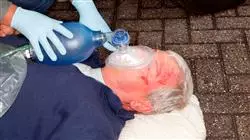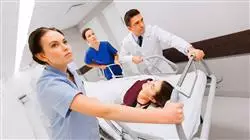University certificate
Scientific endorser

The world's largest faculty of nursing”
Introduction to the Program
Knowing the peculiarities of the emergency department will be fundamental for your professional development in this area, but, above all, for adult and pediatric patient specialized care”

Healthcare in emergency situations is more complex than in other areas, since, given each patient's situation, the first intervention and diagnosis may be complicated. The sick or injured person in need of urgent or emergency care presents acute symptoms, in various forms, which change and evolve in a short period of time. They could be fighting for their lives, depending on which organs are affected, and they may need rapid response care to be saved.
Moreover, the organization of services for patient care in urgent and emergency situations often differentiates between adults and children, which explains why students can find different programs to specialize in emergency nursing. However, this has also created a need for those professionals who are looking for comprehensive, useful and relevant specialization to be able to intervene in all types of patients.
To this end, this program compiles the best of emergency nursing studies, urgent response and catastrophes, as well as the most relevant aspects of pediatric emergencies for nurses, so that they acquire a global and specialized knowledge of the factors that can affect all patients. Specifically, it presents the means and equipment available for urgent interventions, their applications and complications so that they can be used appropriately in each emergency situation, including basic and advanced life support, which is essential for critical patients. Furthermore, taking into account the current COVID-19 pandemic, the program includes a specific syllabus to explain its microbiological characteristics, diagnostic tests and treatments, as well as ways of intervening in coronavirus patients.
It should be noted that this program is totally different from others that can be found on the market, since it places experience as the foundation of the theory, providing global and sufficient knowledge to practice.
When pediatric patients get to the emergency room, they require specialized care that you will learn about by studying this Advanced Master's Degree”
This Advanced master’s degree in Emergency Nursing in Adult and Pediatric Patients is the most complete and up-to-date program on the market. The most important features include:
- Practical cases presented by experts in Emergency Nursing
- The graphic, schematic, and eminently practical contents with which they are created, provide scientific and practical information on the disciplines that are essential for professional practice
- Practical exercises where self-assessment can be used to improve learning
- Special emphasis on innovative methodologies in Emergency Nursing
- Theoretical lessons, questions to the expert, debate forums on controversial topics, and individual reflection assignments
- Content that is accessible from any fixed or portable device with an Internet connection
TECH is a 21st century university and is committed to online teaching as its main method of learning”
The teaching staff includes nursing professionals who bring their experience to this training program, as well as renowned specialists from leading societies and prestigious universities.
The multimedia content, developed using the latest educational technology, will provide the professional with situated and contextual learning, i.e., a simulated environment that will provide an immersive training experience designed to train for real-life situations.
This program is designed around Problem-Based Learning, whereby the student must try to solve the different professional practice situations that arise during the course. For this purpose, the professional will be assisted by an innovative interactive video system created by renowned and experienced experts.
Specialize in emergency nursing and learn to care for adult and pediatric patients with different conditions"

A 100% online update that will allow you to balance your studies with the rest of your daily obligations"
Why study at TECH?
TECH is the world’s largest online university. With an impressive catalog of more than 14,000 university programs available in 11 languages, it is positioned as a leader in employability, with a 99% job placement rate. In addition, it relies on an enormous faculty of more than 6,000 professors of the highest international renown.

Study at the world's largest online university and guarantee your professional success. The future starts at TECH”
The world’s best online university according to FORBES
The prestigious Forbes magazine, specialized in business and finance, has highlighted TECH as “the world's best online university” This is what they have recently stated in an article in their digital edition in which they echo the success story of this institution, “thanks to the academic offer it provides, the selection of its teaching staff, and an innovative learning method aimed at educating the professionals of the future”
A revolutionary study method, a cutting-edge faculty and a practical focus: the key to TECH's success.
The most complete study plans on the university scene
TECH offers the most complete study plans on the university scene, with syllabuses that cover fundamental concepts and, at the same time, the main scientific advances in their specific scientific areas. In addition, these programs are continuously being updated to guarantee students the academic vanguard and the most in-demand professional skills. In this way, the university's qualifications provide its graduates with a significant advantage to propel their careers to success.
TECH offers the most comprehensive and intensive study plans on the current university scene.
A world-class teaching staff
TECH's teaching staff is made up of more than 6,000 professors with the highest international recognition. Professors, researchers and top executives of multinational companies, including Isaiah Covington, performance coach of the Boston Celtics; Magda Romanska, principal investigator at Harvard MetaLAB; Ignacio Wistumba, chairman of the department of translational molecular pathology at MD Anderson Cancer Center; and D.W. Pine, creative director of TIME magazine, among others.
Internationally renowned experts, specialized in different branches of Health, Technology, Communication and Business, form part of the TECH faculty.
A unique learning method
TECH is the first university to use Relearning in all its programs. It is the best online learning methodology, accredited with international teaching quality certifications, provided by prestigious educational agencies. In addition, this disruptive educational model is complemented with the “Case Method”, thereby setting up a unique online teaching strategy. Innovative teaching resources are also implemented, including detailed videos, infographics and interactive summaries.
TECH combines Relearning and the Case Method in all its university programs to guarantee excellent theoretical and practical learning, studying whenever and wherever you want.
The world's largest online university
TECH is the world’s largest online university. We are the largest educational institution, with the best and widest online educational catalog, one hundred percent online and covering the vast majority of areas of knowledge. We offer a large selection of our own degrees and accredited online undergraduate and postgraduate degrees. In total, more than 14,000 university degrees, in eleven different languages, make us the largest educational largest in the world.
TECH has the world's most extensive catalog of academic and official programs, available in more than 11 languages.
Google Premier Partner
The American technology giant has awarded TECH the Google Google Premier Partner badge. This award, which is only available to 3% of the world's companies, highlights the efficient, flexible and tailored experience that this university provides to students. The recognition as a Google Premier Partner not only accredits the maximum rigor, performance and investment in TECH's digital infrastructures, but also places this university as one of the world's leading technology companies.
Google has positioned TECH in the top 3% of the world's most important technology companies by awarding it its Google Premier Partner badge.
The official online university of the NBA
TECH is the official online university of the NBA. Thanks to our agreement with the biggest league in basketball, we offer our students exclusive university programs, as well as a wide variety of educational resources focused on the business of the league and other areas of the sports industry. Each program is made up of a uniquely designed syllabus and features exceptional guest hosts: professionals with a distinguished sports background who will offer their expertise on the most relevant topics.
TECH has been selected by the NBA, the world's top basketball league, as its official online university.
The top-rated university by its students
Students have positioned TECH as the world's top-rated university on the main review websites, with a highest rating of 4.9 out of 5, obtained from more than 1,000 reviews. These results consolidate TECH as the benchmark university institution at an international level, reflecting the excellence and positive impact of its educational model.” reflecting the excellence and positive impact of its educational model.”
TECH is the world’s top-rated university by its students.
Leaders in employability
TECH has managed to become the leading university in employability. 99% of its students obtain jobs in the academic field they have studied, within one year of completing any of the university's programs. A similar number achieve immediate career enhancement. All this thanks to a study methodology that bases its effectiveness on the acquisition of practical skills, which are absolutely necessary for professional development.
99% of TECH graduates find a job within a year of completing their studies.
Advanced Master's Degree in Emergency Nursing in the Adult and Pediatric Patient
Care in critical situations such as accidents, heart attacks, respiratory failure or paralysis (among many other pathologies), represent a great challenge for healthcare personnel. Therefore, it is essential to have specialists with immediate reaction skills. At TECH Global University we have developed an Advanced Master's Degree in Emergency Nursing in the Adult and Pediatric Patient, with which you will learn the latest techniques and tools implemented in emergency care in this type of patient. The program has a 100% online study mode, focused on enhancing your skills progressively. Here, you will have state-of-the-art educational equipment, which includes the continuous accompaniment of a team of specialists and lessons supported by multimedia material. During the course of the two-year course, you will learn about nursing care in cardiac, respiratory, neurological, digestive, ophthalmological and endocrine emergencies, as well as traumatic accidents, osteoarticular injuries and infectious diseases such as coronavirus. By taking each thematic axis, you will obtain a high-level background to attend hospital and out-of-hospital emergencies with greater safety.
Be an expert in pediatric and adult patient emergency care.
According to reports published by the World Health Organization (WHO), approximately 100 children die every hour worldwide due to accidents such as drowning, burns, falls or poisoning. They also indicated that non-communicable diseases, stroke and ischemic heart disease (among others) are the main causes of death in adults. This is why the specialization of professionals in this field is so essential. In this TECH postgraduate course you will find the necessary tools to strengthen your skills in the diagnosis and treatment of patients who require priority attention. By accessing our Postgraduate Certificate, you will contribute to the improvement in the quality of life of the user, through the implementation of the best Nursing services. During the course of the Professional Master's Degree, you will specialize in managing the organization of the hospital emergency unit, life support techniques and advanced cardiopulmonary resuscitation maneuvers. You will also master the preparation of sedoanalgesia, personalized pharmacology and diagnostic-therapeutic techniques. Because of this, you will be able to perform follow-ups and evaluations that contribute to the integral recovery of each patient.







